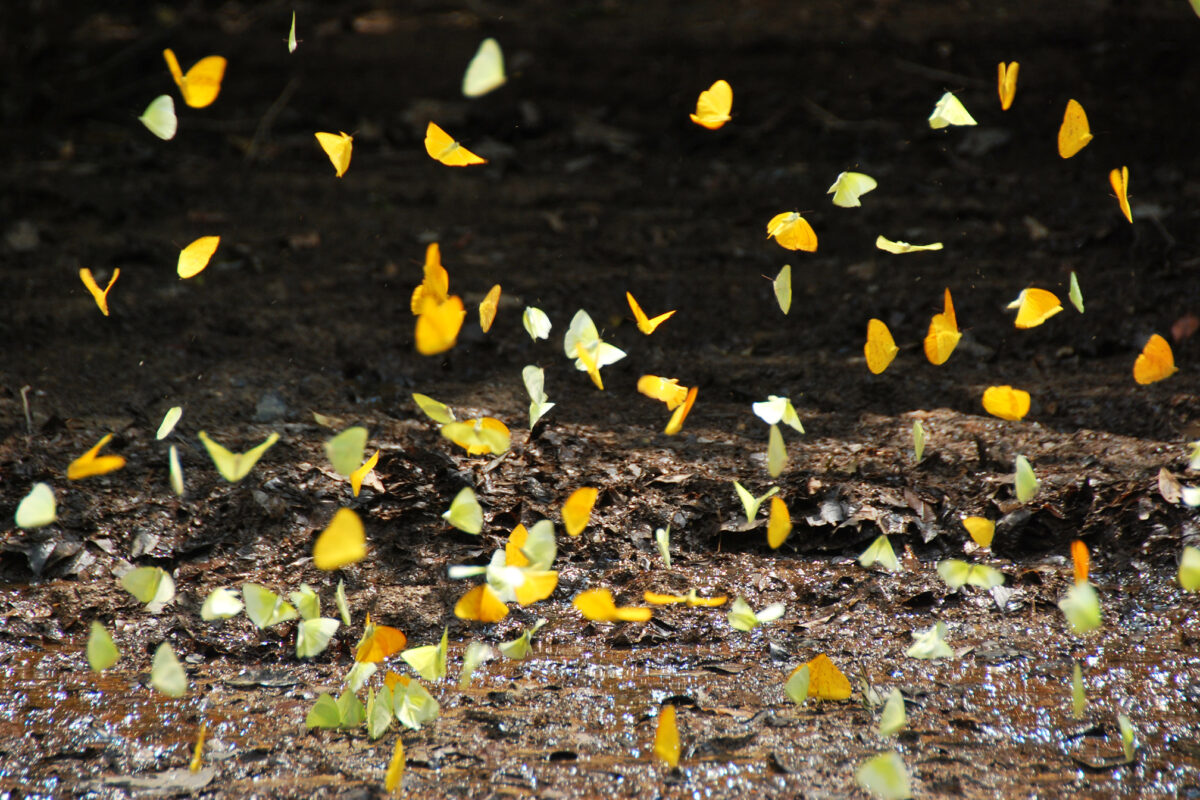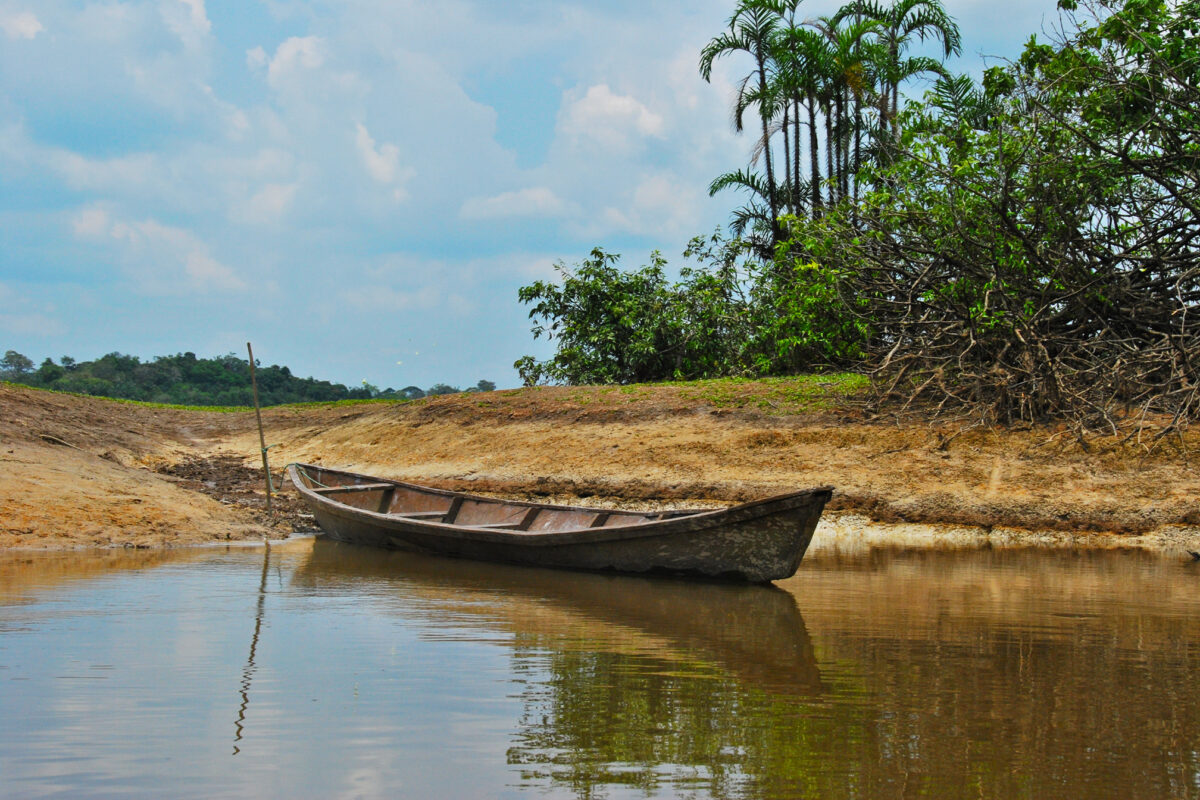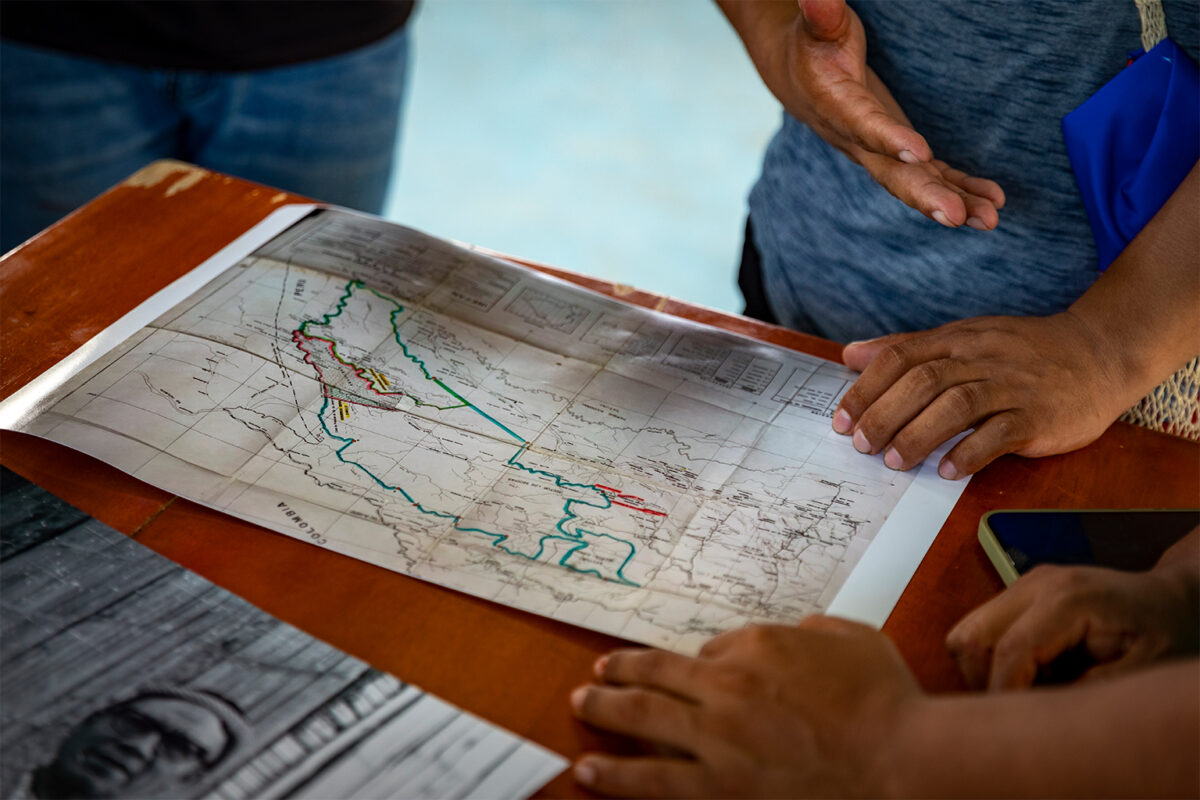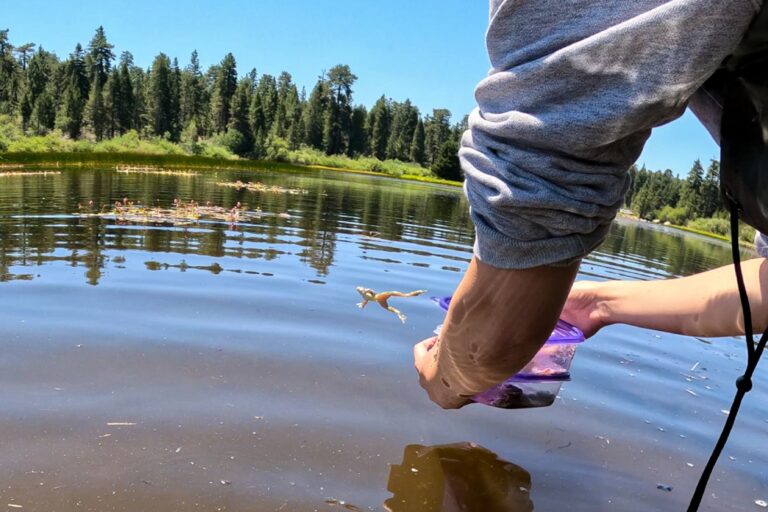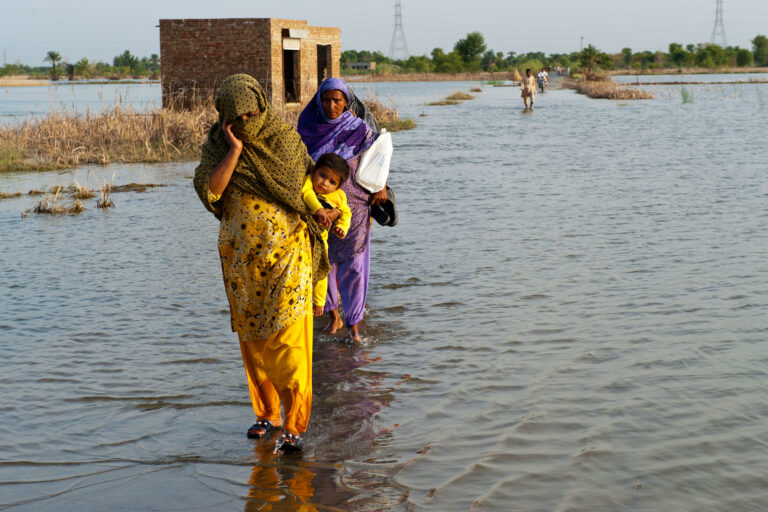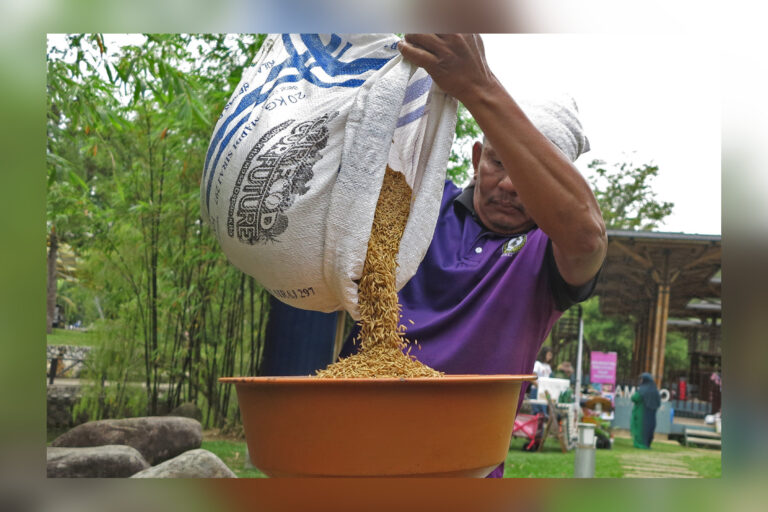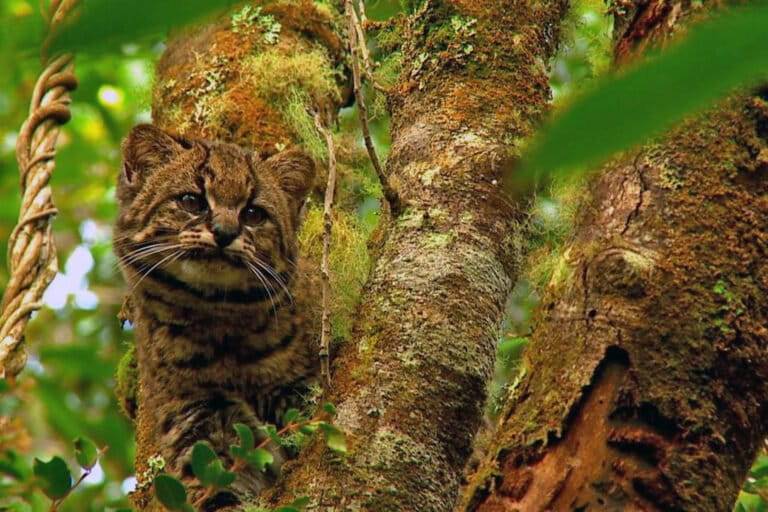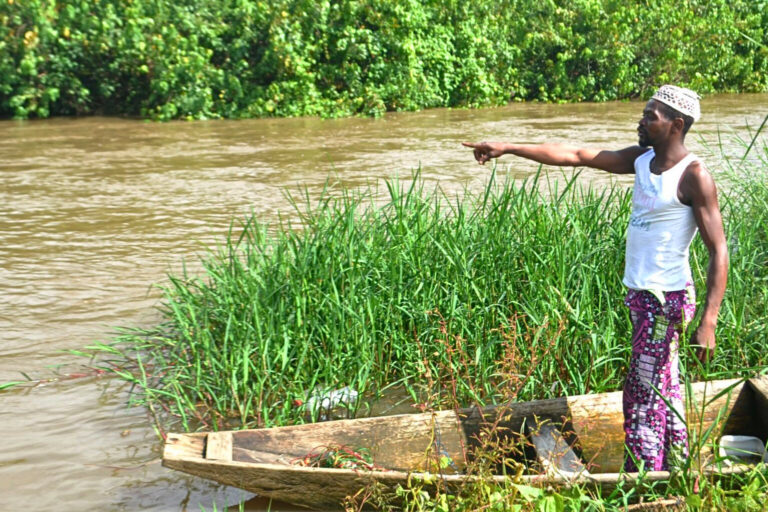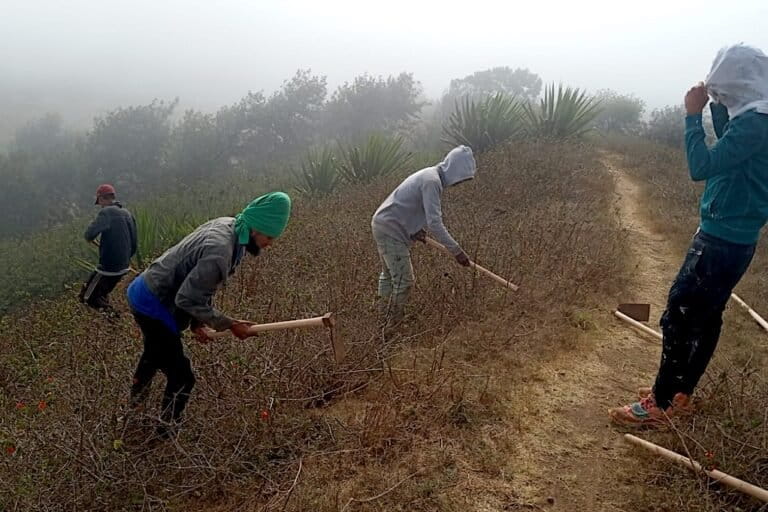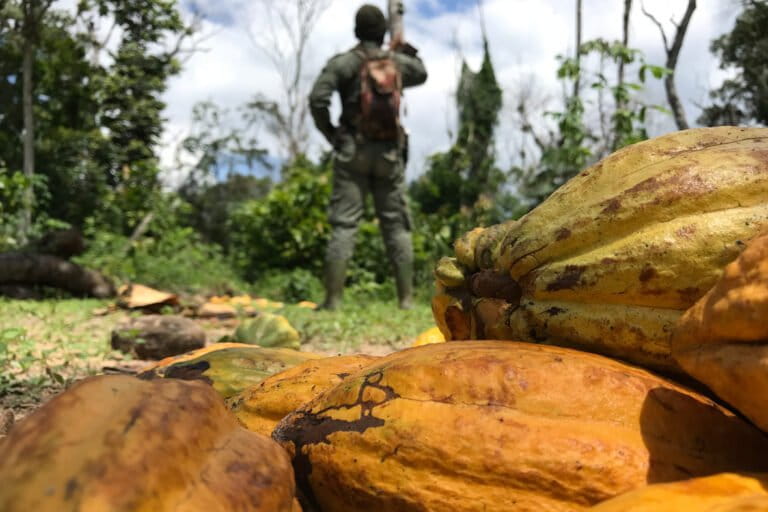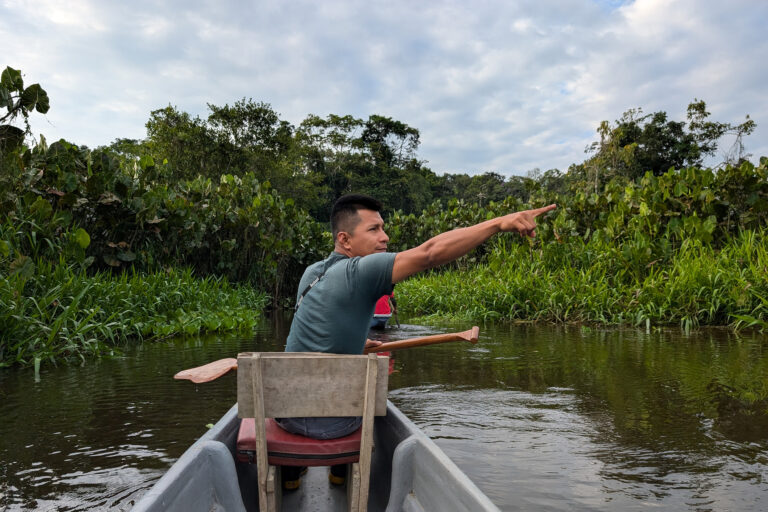- In addition to being a shaman, Davi Kopenawa is a shaman and a political leader active in denouncing the gold miners who illegally invaded the Yanomami Indigenous Land, in the Brazilian Amazon.
- The Yanomami, who inhabit Brazil’s largest Indigenous Land, still face a humanitarian and health crisis, worsened by the invasion of 70,000 illegal miners. Increased under the Jair Bolsonaro government, the invasion brought diseases and contaminated rivers with mercury.
- In this interview, Kopenawa criticizes the environmental and social impacts of administrations led by politicians such as Jair Bolsonaro and Donald Trump.
BOA VISTA, Brazil – This year alone, Yanomami shaman Davi Kopenawa was received by Pope Francis at the Vatican, was featured at a special place by Salgueiro Samba School during Rio de Janeiro’s carnival parade, and was given enthusiastic applause during the Cannes Film Festival in France. However, in his home state of Roraima, he has to travel in a patrol car escorted by armed police officers.
In addition to being a shaman, 68-year-old Kopenawa is a political leader active in denouncing the gold miners who illegally invaded the Yanomami Indigenous Land, in the Brazilian Amazon. Because he defends the rights of his people, he cannot walk freely.
In addition to the gold miners, he makes a point of naming politicians who he sees as enemies of the Yanomami and the Amazon rainforest, such as the recently elected US President Donald Trump and Brazil’s former President Jair Bolsonaro.
In an exclusive interview with Repórter Brasil, Kopenawa compared Trump to a “disease,” saying that the Republican politician represents a threat to Indigenous peoples and the environment.
The Indigenous leader fears that the influence of Trump and other far-right leaders could pave the way for unbridled exploitation of Indigenous lands.
In addition, Kopenawa harshly criticizes Bolsonaro, whom he considers the “son of the military dictatorship” who never cared about Indigenous people or the environment. He says that the Bolsonaro government “ruined everything,” allowing illegal mining to advance in the Yanomami territory and the health of his people to deteriorate.
The Yanomami, who inhabit Brazil’s largest Indigenous territory, still face a humanitarian and health crisis, worsened by the invasion of 70,000 illegal miners. Increased under Bolsonaro, the invasion brought diseases such as malaria and the flu and contaminated rivers with mercury that affects drinking water and fish, which are the basis of the Yanomami diet.
Child malnutrition affected 63% of Yanomami under the age of five and resulted in the deaths of 570 children from malnutrition and preventable diseases between 2019 and 2022.
Kopenawa is hopeful regarding the commitment of the Lula (PT) administration to combating illegal mining but criticizes its health care policies. He recognizes the current government’s efforts to reverse the damage caused by previous administrations. However, he warns that more effective action is needed such as completely removing miners from their ancestral territory and sending more health professionals.
The shaman is also an internationally acclaimed writer. He is the author of The Falling Sky: words of a Yanomami shaman (Belknap Pres, 2013), written with anthropologist Bruce Albert.
The works have been translated into several languages, inspired films and documentaries, and have become landmarks in contemporary ecological and anthropological thought, introducing the world to Yanomami cosmology and the importance of the forest for the planet’s health.
“An arrow to touch the heart of non-Indigenous society,” Kopenawa writes when someone asks for a dedication in his works.
The shamans of the Yanomami, known as xapiri thëpë, are crucial to their culture and cosmology. They act as intermediaries between the material world and the spiritual world, connecting with the spirits of the forest (xapiripë) to seek guidance, healing, and protection for the community.
Davi Kopenawa is the best known of these guardians of ancestral wisdom and one of the people responsible for maintaining balance between humanity and nature.
Shamans learn through dreams, visions and the use of psychoactive substances, such as yãkoana – a powder made from a resin of trees of the Virola genus, which enables them to access the spiritual world and receive teachings from the xapiripë.
After a 12-year hiatus, a historic meeting of Yanomami shamans took place in November in the Yakeplaopi community, in Palimiu, on the banks of the Uraricoera River, one of the areas most affected by the invasion of illegal miners. The event gathered more than 500 Indigenous people, including 62 shamans, from 18 regions of Roraima and Amazonas, to celebrate the 20th anniversary of the Hutukara Yanomami Association.
Kopenawa stresses the importance of the shamans and criticizes the relationship between white man and nature, stating that the “merchandise man” seeks only to exploit natural resources in order to get rich, without caring about the consequences for the environment and Indigenous peoples.
The shaman emphasizes the need for a change of mindset on the part of white men, so that they learn to respect nature. He vehemently expresses his aversion to wearing gold, associating it with greed and destruction.
He says that gold is the “blood” of the land, the forest and its people, stained with the suffering caused by illegal mining. And he urges people not to wear gold. “That has to stop. You don’t need to adorn yourselves with jewelry. You don’t need rings and necklaces. You can wear other things, wear something that isn’t covered in blood,” he says.
The following interview has been lightly edited for length and clarity.
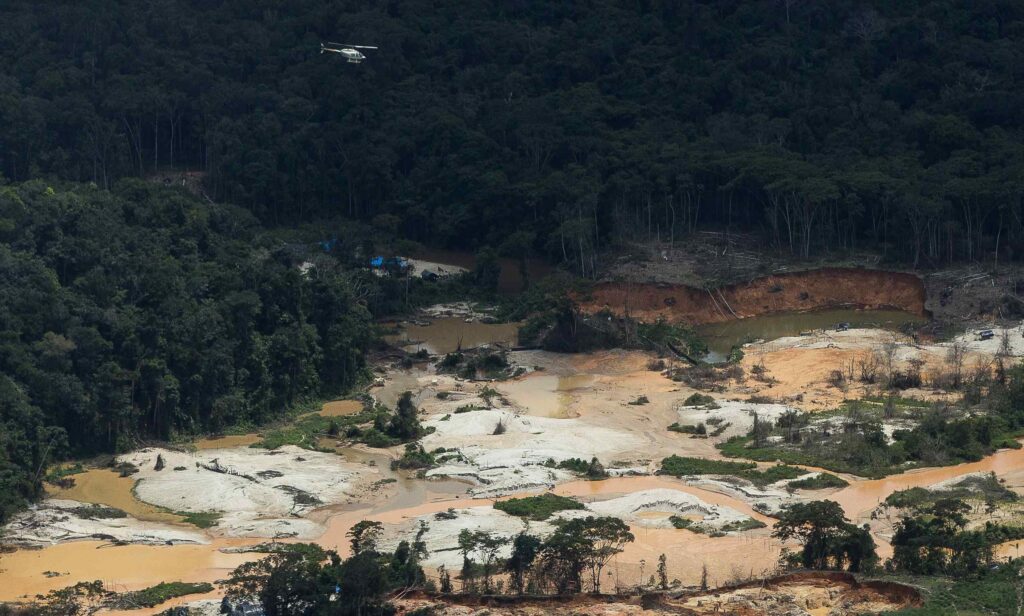
How do you see the government’s work to remove the miners from the Yanomami territory? Is this fight over?
The fight to defend my Yanomami people, our land, water and forest is an old one. White people have been destroying nature and disturbing the Indigenous people who have lived here for thousands of years. The government’s move to Boa Vista made it easier to work against the miners on Yanomami land [In February, the federal government opened a government headquartersin the state capital of Roraima.] The Lula administration supported the cause and was against continuing illegal mining and the suffering of the Indigenous people.
What concerns you most about mining?
Mining brings disease and violence, causing many problems. The miners arrive with machinery, gasoline, alcoholic beverages and weapons, in addition to bringing diseases and mistreating the Yanomami people. The government’s operation resulted in the removal of many miners and the destruction of their machinery, but the problem persists. Many remain in hiding or buy new equipment, counting on remote support.
What needs to be done now?
We must remove more miners. Not all of them have left. They are hiding in the mountains and in Venezuela, waiting for the government to leave so they can return. And they are returning.
And how is the health of the Yanomami people? Malaria, hunger and disease?
Malaria, the flu, dysentery and worm diseases continue. The disease will not go away. There is a lack of care for the health of the Yanomami. We lack doctors, nurses, technicians, equipment, medicines and spraying to kill mosquitoes. The disease has not gone away. Our relatives* who live near the mining sites continue to get sick. Malaria is a dangerous disease for everyone, not just for Indigenous people. We need a government that takes care of health, that organizes a work plan and cures the Yanomami in the communities, providing equipment and medicines.
* It is common for Indigenous peoples from different groups to address one another as “relatives,” even without direct blood ties. This practice reflects a shared recognition of their identity as Indigenous people across diverse communities
Illegal mining has increased and health has worsened a lot under the Bolsonaro administration. What do you feel when you see the former president?
You people chose the wrong man. You were wrong to think he was good. For me, for the Yanomami, he is the son of the military dictatorship, which never liked Brazil’s Indigenous people. He is not a good man, he is not a friend of Indigenous people, the land, the rivers and the environment. He is against our country.
For many years, you have fought for your people and the Amazon. You have a very rich background. What gives you the strength to continue?
I feel and dream about Mother Earth, about the great soul of the land and the forest. This gives me the strength to continue fighting.
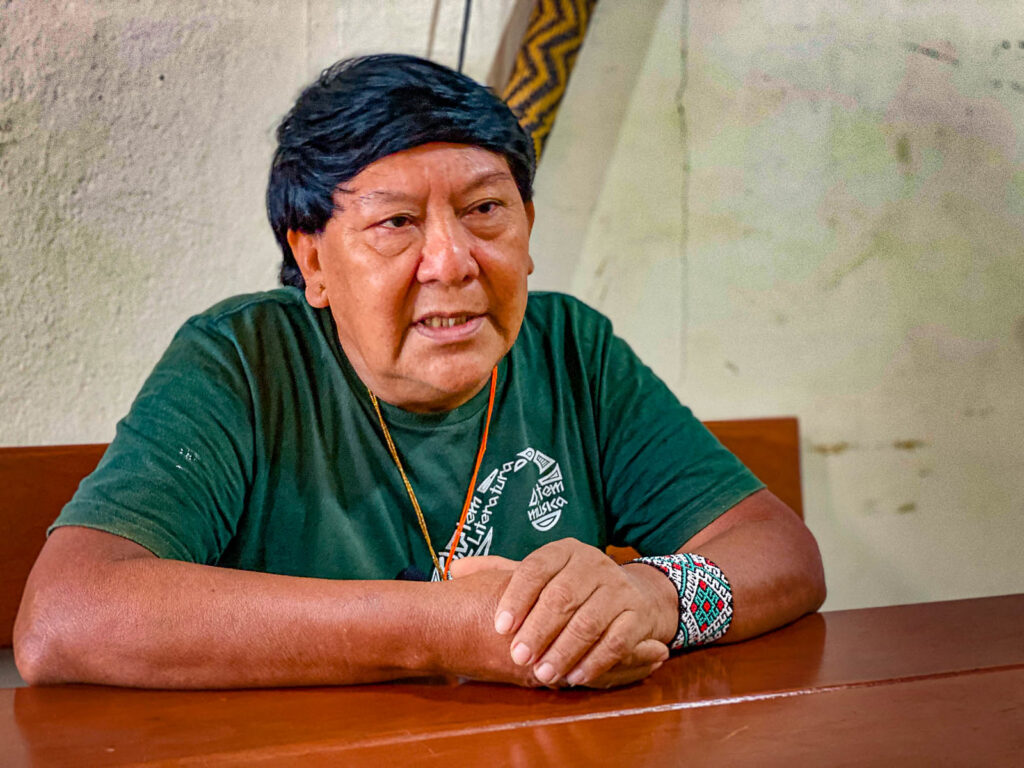
You are like a bridge between the white people’s world (napë) and the Yanomami world. How do you feel in this role?
I’m a translator for my people. I listen to Portuguese, which is difficult, but I can understand. I translate it for them: “Look, my relatives, the whites keep talking about taking the wealth from the land. Non-Indigenous society loves what is beneath the surface. Gold, diamonds, precious stones, niobium, to make the hearts of machines. The white people love minerals to make money and trade them with other peoples. They still want the timber, and the loggers cut down the trees to make money. They want to destroy the streams where we drink, to take the wealth away from the Indigenous land. They don’t want us to continue living here; they want to remove us, to put us somewhere else, where there is no gold, where there is nothing.”
The Yanomami also ask me to translate their words for the white man: “White men have already taken a lot of wealth from the land. Why do they want more? Where are they planting this wealth? Where are they keeping it? For thousands of years, they have taken a lot, they’ve cut down the forests. Is this the right thing to do? Where are they taking all this? Why do white men destroy nature? What do they think? And what about the water? The white man drinks a lot of water, he is making it dirty. Why?” I’m a translator. I translate it for my people and for non-Indigenous society, so that they can better understand each other, because men in society are used to extracting and exploiting the underground.
Is the Earth taking revenge on the white man with these changes in the climate?
Yes, the Earth is revolted by the unceasing human actions. Month after month, year after year, rivers are destroyed, water is polluted, fish die, and people get sick. Non-Indigenous society only thinks about money and about exploiting it more and more. The authorities, who should protect nature, ignore the laws and contribute to increasing deforestation. This causes the forest to heat up and dry out, and our Mother Earth to show her anger. We are already seeing the effects of this revenge in other places such as in Europe and the US, with fires and natural disasters. This destruction doesn’t stop and is killing our Mother Earth.
Can we do anything to prevent the Earth’s revenge?
There is no way to go back, to normalize it. No man can heal our Mother Earth. They can spend money and hold many beautiful meetings, but they will not heal her. I’m a shaman, I’m a dreamer, the Yanomami people are different. We listen to the Earth speak, and it tells us: “Look, Yanomami, be careful, I’m going to let the white man suffer, he’s going to suffer a lot, he’s going to face some suffering, it’s going to get worse.” Climate change has already taken root and spread, and now it is strong. There is no cure for global warming.
You talk a lot about dreams. How important are dreams for the Yanomami? Can white people dream like you?
Dreams are not just for Indigenous people, they’re for everyone. You can dream about other things. About work, about extracting gold, extracting oil from the sea, cutting down trees to make paper, making poison, mercury. About airplanes, cars, factories, about city lights and monuments. Our dreams are different. We are different, we are the children of Omama, the king of the forest, the king of the world. We dream because we are connected to the great soul of the land, to the great soul of the forest, to the wind, the rain, the thunder, the light, the sun, the moon. We are connected in a different way. Since we live in the forest, far from the city and the light, we are different dreamers. Do we dream good or bad? This is the natural dream, as Omama created for the people of the forest. The people of the city also dream, but many don’t dream because they don’t sleep. They walk, they party, they drink. The city has no darkness; it is lit day and night. The white man sleeps little.
What did the recent meeting of shamans mean to the Yanomami people?
The Hutukara Yanomami Association plays a crucial role in defending our people. “Hutukara” means “world”, while “association” is a term that comes from non-Indigenous society, and “Yanomami” means “people.” The Hutukara is the Law of Omama’s People. In 2004, we didn’t have this structure, but we learned from the white man about the importance of laws. Last month, we celebrated the 20th anniversary of the Hutukara with a big party in the communities. It was a beautiful, valuable and essential event for us. Even though many people are unaware or doubt it, we are taking care of everything. Hutukara is a symbol of the defence of our land and the planet. We brought together more than 300 people, including 62 shamans – Indigenous people who care for the health of the land, the forest and the environment. We renewed our commitment to strengthening Hutukara.
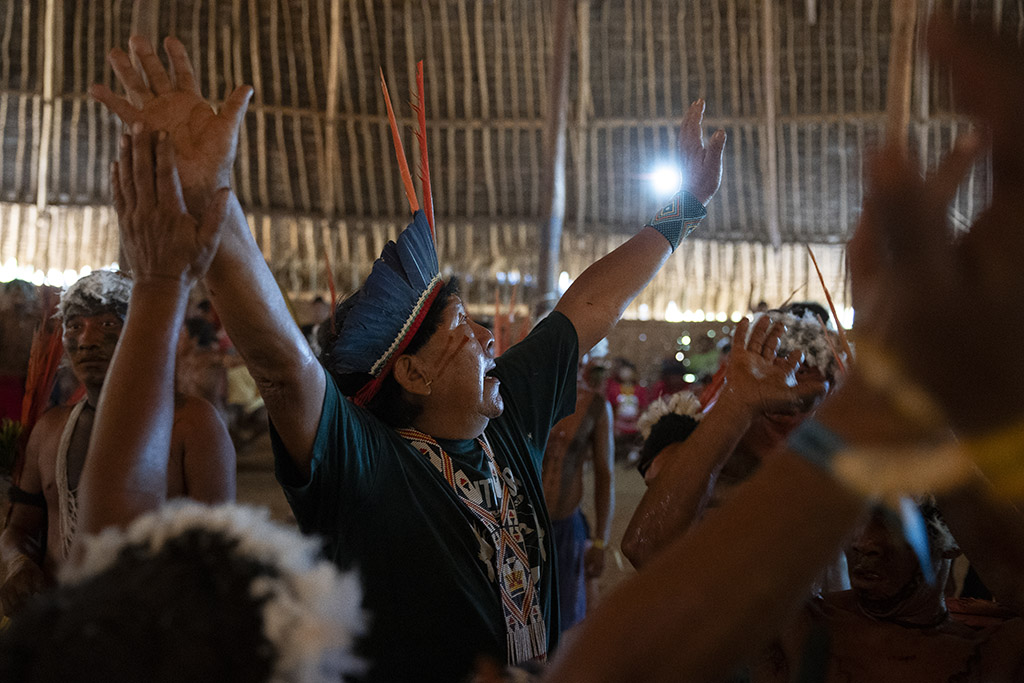
Why did you choose to hold the meeting in a place that has suffered major impacts caused by gold mining?
Uraricoera is a route used by illegal gold miners. That is why we built a house there, which symbolizes the resistance of the Yanomami people, as a clear message that this path is not for gold miners. They can explore their own lands, but the Yanomami Indigenous Land must be respected. However, the miners are persistent. This house was built as a landmark to protect the rivers in the region and reinforce our struggle.
Do you think President Lula is truly committed to the Indigenous cause?
He is the best. I’ve known him since 1988, when they drafted the Federal Constitution in Brasília. At that time, he was already becoming friends with us. When Lula was the president, he was arresting the miners. He dreamed of a place without mining, without farmers, nothing. He had a good idea and he tried it, but there is a lot of destruction in the city, in the communities, in the municipalities. Bolsonaro ruined everything. Lula is trying to heal the city, the municipalities and the Yanomami land. He is demarcating Indigenous lands that had never been demarcated. He has good ideas, he picked up his pen, like an honest man, to write and save Brazil. Not only the Yanomami, but the whole country. He is trying, but there are a lot of bad people.
How do you see the participation of Sônia Guajajara as the Minister of Indigenous Peoples and Joenia Wapichana at Funai (Indigenous Peoples National Foundation)?
There aren’t many of us, but we need more people to stand by the Lula administration and the Yanomami and Indigenous warriors who are fighting. They learned from us. Sônia Guajajara was in the village and Joenia Wapichana learned from her people. They prepared themselves, and we put them there to be warriors for the Indigenous people and the city as well. They are learning to solve problems, but they won’t solve everything. They have a lot of responsibility that the government has given them. It’s difficult for us because we don’t know the political role. Indigenous people don’t know much about that. They are learning, walking alongside the shamans, with the Indigenous movement in Brasília, with deputies, senators and others who fight on our side. We are working to live, so that everyone can have a life. Without the fight, we’ll suffer more.
Is there anything you would like to add, any important message?
’d like to talk more about my concern about US president [elect] Donald Trump. This guy is no good. He has already made many mistakes, and I fear that he will cause even more destruction. Bolsonaro seems to support these ideas, and that worries me. Trump is like a disease, a problem that paves the way for illegal mining on Indigenous lands, such as the Kayapó, Munduruku and Yanomami territories. We can’t let this happen again. There has been too much suffering. Enough is enough.
What would you say to someone who reads this interview and is wearing a gold necklace, a gold ring?
My message is for everyone in the city: people are fascinated by gold, wearing it as rings, earrings and other jewelry. But they need to understand that it is extracted from Indigenous lands. This gold carries the blood of my people, of the trees, the rivers, the fish and Mother Earth. Many are dying because of that exploitation. It has to stop. They don’t need to adorn themselves with jewelry. They don’t need rings and necklaces. They can wear other things, wear something that is not blood.
Related stories
Organized crime brings renewed threats to Yanomami in Brazil
Six months on, the Yanomami crisis continues amid rising violence
‘Don’t buy Brazilian gold’: Q&A with Indigenous leader Júnior Hekurari Yanomami
This interview was originally published on Repórter Brasil on November 28, 2024.



